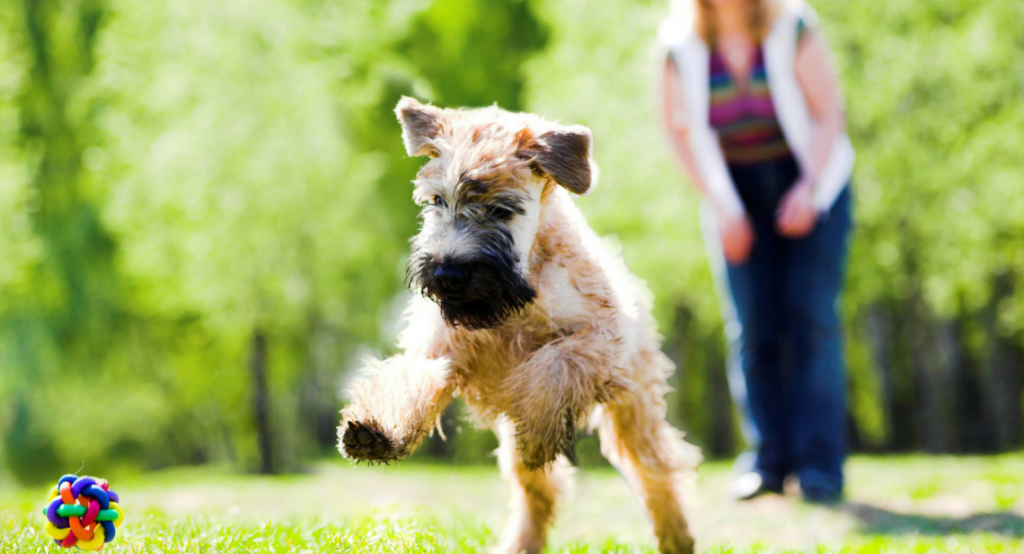Probiotics: The Scoop on Happy Dogs Poop

Happy dogs make happy poop. What’s happy poop look like? Well, think of the last time you had to clean up after your dog’s diarrhea. (I know, that’s not a happy memory of a happy sight.) Now think of the opposite.
Happy poops are firm (not gooey, not rock hard), medium brown, and relatively inoffensive in their smell. They’re easy to pick up, and you don’t turn your head and gag when you close up the poop bag.
Healthy poops like these are a sign of intestinal health.
It turns out the intestines are a very busy place in your dog. This exceptionally long tube that stretches from your dog’s stomach to his, er, bum, is filled with activity.
All sorts of wonderful things are absorbed by the intestines so that they can help your dog’s body. Not least, water is absorbed here, as well as nutrients, fuel, and vitamins from your dog’s meals. Protein that was digested in the stomach, as well as starch and fat, are also absorbed by the intestines. The bloodstream encounters this flow of vital goodness at the intestines before it carries it to the rest of the body.
Weirdly enough, some of this absorption needs microbes in order to work well. Healthy intestines are home for all kinds of healthy bacteria, which create vitamins (!!) and important fuel building blocks for your dog. Healthy bacteria, when there is enough of them, also crowd out any unhealthy bacteria that may try to enter the bloodstream.
When the intestines are healthy and normal and filled with good bacteria, your dog has what I call happy poops.
On the other hand, stinky, slimy, icky, watery poops are a sign that something is going on inside. Something not healthy.
Intestinal inflammation can cause diarrhea, for example. When the walls of the intestines get inflamed — swollen and red, which can happen when there’s an infection or irritation — the intestines don’t work as well as they should. They can’t absorb as much water as they normally do, leaving more water in the poop than is normally there. They also can’t absorb anything else as well — meaning your dog gets less nutrition from meals, and more undigested food gets passed through.
Which means icky diarrhea.
Another, and sometimes a related, problem can come if there isn’t enough healthy bacteria in the intestines. Not enough healthy bacteria means that some vitamins and fuel aren’t manufactured, leaving your dog less nourished.
Less healthy bacteria also means there is plenty of room for unhealthy bacteria to move in and colonize the intestine. Colonies of e.coli, bacteroides, salmonella, and other icky bugs are commonly found in intestines with low levels of healthy bacteria.
These unhealthy bacteria don’t just stay in the intestine, though. They can also enter the bloodstream, slowly seeping into the body and creating low-grade organ health issues. These bad bugs also secrete waste products that can eventually cause cancer! This is a fact that very few vets or physicians know — but there is plenty of research to show it is true.
[Click click here, and here for two of the many examples.]
It is REALLY important that your dog’s gut has a thriving colony of healthy bacteria to crowd out the bad bugs.
Puppies pick up populations of good bacteria while they’re born — from the mother’s birth canal. As long as the mother has a good population of healthy bacteria, pups get what they need, and the good bacteria can establish a colony that will live on with the pup as it grows.
But if mom doesn’t have good bacteria, or if the puppies are born by C-section, they may never get the good bacteria they need. Even if they do, if they get sick and are treated with antibiotics, that good bacteria will die off as a result. This is something we often don’t think about when our dogs get sick, but it’s really important. After antibiotics use, healthy bacteria levels have to be re-established. And if your dog was born by C-section, it’s really important.
In these cases, the only way to get good bacteria into the intestines is to eat it. Good bacteria strains are known as probiotics, and there are several of them that are considered helpful. EverPup includes a very special type of probiotic, called Lactobacillus sporogenees (also known as Bacillus coagulans). These bacteria have a “natural envelope” or shield, which means they can travel all the way to the large intestine without being destroyed by the digestive system.
The best thing about probiotics is that even if you have a thriving population of good bacteria in your dog’s intestines, the more the merrier. This is one of the ways that EverPup helps your pup poop happy poops — and possibly avoid a whole host of problems related to unhappy intestines.
Best,
Dr D
